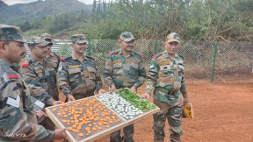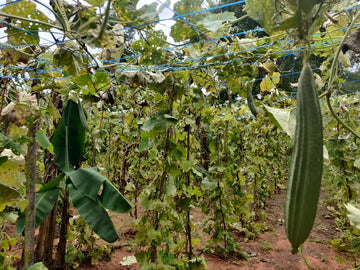Our first agritech training facility for retiring soldiers goes live in Madras Regimental Centre, Coonoor
by Ved Prakash Sharma on Apr 12, 2024


05 Apr 2023 was a landmark day in pursuit of our mission to help ex-servicemen with dignified livelihood and entrepreneurial opportunities in their own villages.
This Training facility has been setup for retiring soldiers of madras regiment. About 100 of them retire every month and spend the last three weeks of the service in the madras regimental centre, coonoor. Here, we have currently setup the facility for the following livelihood trainings.
- Value added products through solar drying
- Vermi-composting and natural nutrients
- Food forest model based natural farming
Every training is aimed to generate self-employment and entrepreneurship opportunity
These and similar trainings will be extended to war-widows and disabled soldiers in due course.
The problem we are trying to solve:
Dignified livelihood ex-servicemen in their own villages
It is a little-known fact outside Armed Forces that over 60,000 soldiers retire from Indian Army every year. If we add the numbers from Indian Air force, Navy and Para-military forces, the numbers could be above 1,00,000 per year.
Many of these soldiers retire in the age group 35-45 years. They have usually spent 18-25 years in army having given their best years to the nation. While a number of goverment and industry efforts are in place to help soldiers start a second innings in thier lives, the scale of the issue is significantly large, and a lot more needs to be done.
Most retiring soldiers aspire to settle down in their villages but changing social dynamics (landholdings are reduced, a break-down of joint-family system) and rising financial needs (education of children) force them to move to cities, often seeking low-end jobs like security guards, cab drivers and so on.
Most of them have small landholdings (2-5 acres); but with low knowledge, and usual issues of water, pesticides, costs, and lack of marketing knowledge to sell produce, drives them away from taking up farming as a profession after retirement.

Our Approach
Gratitude Farms model for agritech is designed to solve problems for farmers at multiple levels across the value chain. We have developed our Natural Farming practise based on what we call, Food Forest Model. It imbibes the principle of climate resilient agriculture deeply in every aspect of its design and execution.
The "Food-Forest" model synthesizes three different aspects, viz. Traditional practices of Organic Farming, technology and discipline in daily operations. The principles of design thinking have been applied in developing the model over the last four years. The goal is to develop a replicable model that can give consistent income through practice of natural farming with value additions for small farmers.
On-Farm Value-Additions with multiple benefits
We also have a range of innovative on-farm value additions to increase the revenue per acre for small farmers (solar drying, micro-food forest, enriched vermi-composting and so on).

Through our effort in natural farming and "food-forest model" and integrated "on-farm" value additions, ex-servicemen will be able to setup viable agri-economic activity for themselves without leaving their villages, while serving a larger need of being a change leader for natural / organic farming in their communities. We would like to make efforts to involve family members of martyrs and disabled soldiers for our programs.
Financing through Rang-De for setting up micro entrepreneurship units
We have partnered with Rang-De for providing loans and financing to ESM who plan to become micro - entrepreneurs in their villages, after their training.
Gratitude Farms will hand hold them and more importantly help in selling the produce from the efforts of ESM.
The demand for agritech professionals is set to soar in coming years
There has never been a better time for Agritech industry in our countyr's recent history. Rising demand for healthy food, need for grass root leadership at village level to promote natural farming and all its value additions, most of all soaring investments by Government and Private Sectors are all indicators of future wealth creation for practitioners across the value chain of agriculture. The latest Budget of Government of India has allocated budgetary support for:
One crore farmers for natural farming
10,000 "Bio-input Resource Centres (BRCs)" - production of vermi compost, natural nutrients and natural pest management for farmers.
Our trainings are directly linked to skills needed to support these programs. Our focus is on livelihood centric programs and we will continue to work with ESM who take up thess programs in their villages.
The programs not only help ESM and their family members with dignified livelihood in their own villages, but also serve a deeper environmental impact as well as positive impact on village economy as a whole.
A Nation-Building Activity
Last but probably most importantly,
Developing ex-service as Natural Farming Entrepreneurs not only helps them with their individual economic needs, but also has the potential to become a true Nation-Building activity by unleashing natural farming revolution for small farmers through them.

In coming months and years, we will be setting up similar centres in other Regimental centres across India.
Collabrations and joint Projects in this effort are welcome.




